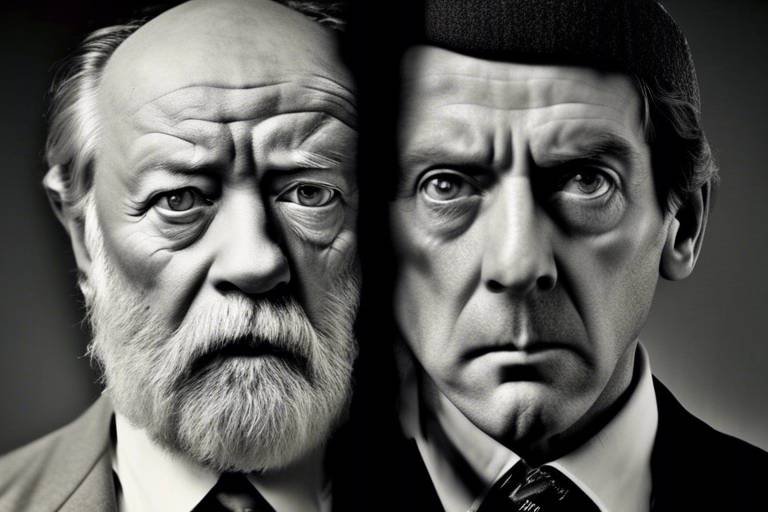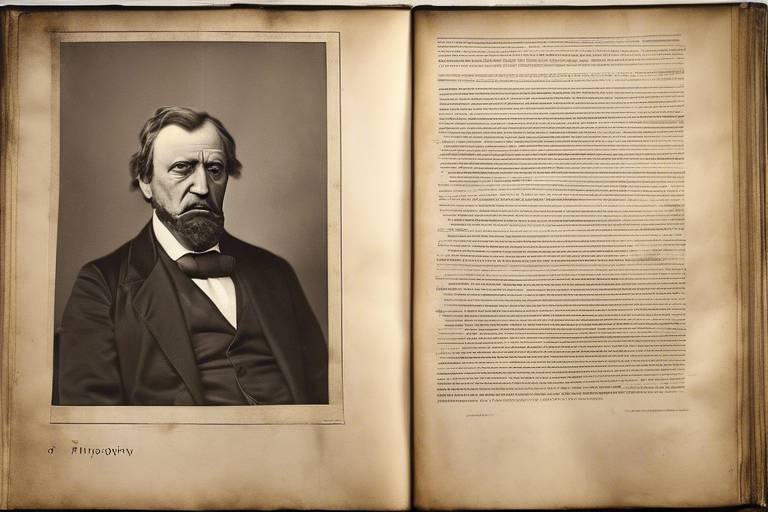Philosophy of Law: Its Impact on Political Systems
The intricate relationship between the philosophy of law and political systems is a fascinating area of study that reveals how our understanding of justice, governance, and societal norms is shaped by various philosophical perspectives. At its core, the philosophy of law examines the fundamental nature of law itself, questioning what it is, how it functions, and what role it plays in our lives. This exploration is not merely academic; it has profound implications for how societies organize themselves, enforce rules, and pursue justice.
Consider this: every law, from traffic regulations to constitutional mandates, is rooted in a philosophical framework that dictates its legitimacy and purpose. This means that the way we interpret laws can significantly influence political authority and state power. For instance, if a society embraces natural law theory, which posits that certain rights are inherent and universal, the laws enacted will reflect these moral values. Conversely, a society that subscribes to legal positivism, viewing law as a construct of human society, may adopt a more pragmatic approach to governance, focusing on the letter of the law rather than its moral implications.
As we delve deeper into the philosophy of law, we uncover how historical contexts and cultural backgrounds shape these philosophical interpretations. Different civilizations have approached the concept of law in unique ways, influenced by their specific needs, challenges, and moral understandings. This historical perspective is essential for grasping how modern legal systems have evolved and how they continue to reflect the philosophical underpinnings established by thinkers throughout history.
In exploring these themes, we will also consider how the philosophy of law interacts with modern political systems. For example, the social contract theory suggests that laws arise from an implicit agreement among individuals to form a society. This theory has been instrumental in shaping democratic systems, emphasizing the importance of citizenship, rights, and responsibilities. By understanding these philosophical foundations, we can better appreciate the complexities of governance and the continuous evolution of legal thought.
Ultimately, the philosophy of law is not just an academic pursuit; it is a lens through which we can examine the very fabric of society. It challenges us to reflect on our values, question our assumptions, and understand the implications of our legal frameworks on our daily lives. As we navigate through this article, we will explore the various dimensions of legal philosophy, including its historical evolution, key theories, and their impact on contemporary political systems.
- What is the philosophy of law? The philosophy of law examines the nature, purpose, and application of law in society, exploring its moral and ethical implications.
- How does legal philosophy impact political systems? Legal philosophy shapes the principles and values that underlie laws, influencing how governance and justice are perceived and enacted.
- What are the main theories in legal philosophy? Key theories include natural law theory, legal positivism, and social contract theory, each offering different perspectives on the nature of law.
- Why is understanding legal philosophy important? It helps individuals and societies understand the foundations of their legal systems, fostering a deeper appreciation of justice and governance.

The Nature of Law
Understanding the essence of law is crucial for grasping its philosophical underpinnings. Law is often viewed as a set of rules that govern behavior within a society, but its implications run much deeper. At its core, law serves as a mechanism for regulating conduct, ensuring stability, and promoting justice. Think of law as the framework of a house; without a solid structure, everything crumbles. Just like a house needs walls and a roof to protect its inhabitants, society requires laws to safeguard individuals and maintain order.
One of the most fascinating aspects of law is its ability to adapt and evolve. Laws are not static; they change in response to societal needs, cultural shifts, and technological advancements. For instance, consider how laws surrounding digital privacy have emerged in response to the rise of the internet and social media. This adaptability highlights the dynamic relationship between law and the society it serves. In essence, law is a living organism, constantly growing and reshaping itself to meet the demands of the time.
Moreover, the nature of law can be categorized into several key characteristics:
- Universality: Laws apply to all individuals within a jurisdiction, ensuring that everyone is held to the same standards.
- Enforceability: Laws must be enforceable, meaning that there are mechanisms in place to uphold them and punish violations.
- Clarity: Effective laws are clearly defined, minimizing ambiguity and confusion regarding their application.
- Stability: While laws can change, they need to provide a sense of stability and predictability within society.
These characteristics illustrate that law is not merely a collection of rules but a vital component of societal structure. It acts as a mirror reflecting the values and norms of a culture, while simultaneously shaping those values through its enforcement and interpretation. This interplay between law and society raises intriguing questions: How do laws reflect the morality of a culture? What happens when laws become outdated or fail to serve the public interest?
In conclusion, the nature of law is multifaceted and deeply intertwined with the fabric of society. It is essential for maintaining order, promoting justice, and reflecting the values of the community. As we navigate the complexities of modern governance, understanding the nature of law becomes increasingly important. It helps us appreciate not only the rules that govern our lives but also the philosophical foundations that underpin those rules.

Historical Perspectives
The evolution of legal philosophy is a fascinating journey that reflects humanity's quest for justice and order. Throughout history, various thinkers have grappled with the nature of law, and their insights have significantly influenced political systems. From ancient civilizations to modern democracies, the way we understand law has undergone profound transformations. This section will explore key philosophical interpretations that have shaped our legal frameworks and governance.
In ancient times, the concept of law was often intertwined with **religious beliefs** and **moral codes**. For example, the Code of Hammurabi, one of the earliest known legal codes, established a set of rules that were believed to be divinely inspired. Similarly, in ancient Greece, philosophers like Plato and Aristotle pondered the relationship between law and morality, laying the groundwork for future legal theories. Plato's idea of an ideal state emphasized the importance of justice, while Aristotle introduced the concept of natural justice, suggesting that laws should reflect universal moral principles.
As we moved into the Middle Ages, the influence of the Church became paramount. Scholastic thinkers like Thomas Aquinas integrated Aristotelian philosophy with Christian theology, arguing that human laws must align with divine law. This perspective reinforced the idea that legal systems should promote a higher moral order, influencing the governance structures of the time. However, the Renaissance sparked a shift in thought, as humanism began to prioritize individual rights and reason over religious dogma.
Fast forward to the Enlightenment, a period marked by revolutionary ideas about liberty and governance. Philosophers such as Hobbes, Locke, and Rousseau introduced the notion of the **social contract**, positing that governments derive their authority from the consent of the governed. This was a radical departure from the divine right of kings, empowering individuals and laying the groundwork for modern democratic systems. The Enlightenment thinkers emphasized the importance of **individual rights**, which would later become central to legal frameworks in many countries.
In the 19th century, the rise of **legal positivism** marked another significant shift. Thinkers like Jeremy Bentham and John Austin argued that law is a human-made construct, separate from morality. This perspective emphasized the importance of codified laws and state authority, influencing the development of modern legal systems. The clear delineation of law from moral values led to more structured legal practices, but also raised questions about justice and equity.
Today, the historical perspectives on legal philosophy remind us that law is not static; it is a dynamic entity that evolves with society. The philosophical debates of the past continue to resonate in contemporary discussions about justice, governance, and individual rights. Understanding these historical contexts allows us to appreciate the complexities of our current legal systems and the philosophical underpinnings that shape them.
As we reflect on these historical perspectives, it becomes clear that law is more than a set of rules; it is a reflection of our collective values and beliefs. The interplay between law and philosophy not only informs our understanding of governance but also challenges us to consider how we can create a more just society for future generations.

Natural Law Theory
is one of the oldest and most influential schools of thought in legal philosophy. It posits that there are certain inherent rights and moral values that are universally applicable to all human beings, regardless of the laws enacted by specific societies. Imagine a compass that always points north, no matter where you are in the world; natural law serves a similar purpose, guiding humans toward justice and morality. This theory suggests that the essence of law is not merely a product of human invention but is instead rooted in the very nature of human existence.
At its core, natural law theory asserts that laws should reflect these universal moral principles. Think of it as a moral framework that transcends cultural and societal boundaries. For instance, concepts such as justice, equality, and human rights are often seen as fundamental truths that should guide the creation and enforcement of laws. This perspective has profound implications for governance and justice systems around the world. When laws align with these inherent principles, they are more likely to promote social harmony and fairness.
However, the application of natural law theory can be complex. Different cultures may interpret these universal principles in various ways, leading to potential conflicts. For example, while the right to life is a fundamental principle in many societies, interpretations of when life begins can vary significantly. This divergence raises questions about how laws should be crafted and enforced in a way that respects these differing interpretations while still adhering to the core tenets of natural law.
Furthermore, natural law theory has been instrumental in shaping legal systems throughout history. Many of the foundational documents that govern modern democracies, such as the United States Declaration of Independence and the Universal Declaration of Human Rights, are heavily influenced by natural law principles. These documents reflect a belief in the inherent dignity of all individuals and the idea that certain rights are not granted by governments but are instead inherent to all humans.
To summarize, natural law theory remains a powerful lens through which to view the relationship between law and morality. It challenges us to consider not just what laws exist, but whether those laws are just and fair. As we move forward in a rapidly changing world, the principles of natural law will continue to spark debates about the nature of justice, governance, and the rights of individuals.
In conclusion, understanding natural law theory is crucial for anyone interested in the foundations of legal systems and their impact on society. It encourages a reflection on the moral underpinnings of laws and serves as a reminder that the quest for justice is an ongoing journey, requiring constant vigilance and engagement from all members of society.

Influence on Modern Jurisprudence
The influence of natural law theory on modern jurisprudence is profound and multifaceted. At its core, natural law suggests that there are fundamental principles of justice that exist independently of human-made laws. This philosophical approach has left an indelible mark on contemporary legal systems, shaping not only the interpretation of laws but also the very foundations upon which those laws stand. Imagine a sturdy building; the principles of natural law act as the bedrock, supporting everything that is constructed above it.
One of the most significant impacts of natural law on modern jurisprudence is the emphasis on **human rights**. Many legal systems today are anchored in the belief that certain rights are inalienable and universal, a concept that can be traced back to natural law theorists. This perspective has led to the establishment of various international human rights treaties and conventions, which aim to protect individuals regardless of their nationality or legal status. For instance, the Universal Declaration of Human Rights, adopted by the United Nations in 1948, embodies the natural law principle that all human beings possess inherent dignity and rights.
Moreover, natural law theory has influenced judicial decision-making processes. Judges often invoke natural law principles when interpreting statutes or adjudicating cases, particularly in matters involving moral dilemmas or ethical questions. This can be seen in landmark rulings where courts have recognized certain rights based on moral reasoning rather than solely on statutory language. For example, in cases concerning **privacy rights** or **freedom of expression**, judges may reference natural law to justify their decisions, arguing that these rights are essential to human dignity.
However, the integration of natural law into modern jurisprudence is not without its challenges. Critics argue that reliance on natural law can introduce subjectivity into legal interpretation, as what is considered 'natural' or 'moral' can vary significantly across cultures and societies. This subjectivity can lead to inconsistencies in legal rulings and a lack of predictability in the law. To illustrate this point, consider the following table that outlines some of the key contrasts between natural law and legal positivism:
| Aspect | Natural Law | Legal Positivism |
|---|---|---|
| Source of Law | Inherent moral principles | Human-made statutes |
| Focus | Justice and morality | Order and authority |
| Interpretation | Subjective moral reasoning | Objective legal frameworks |
| Examples | Universal human rights | Traffic laws, tax codes |
Despite these critiques, the enduring legacy of natural law theory in modern jurisprudence cannot be overstated. It serves as a guiding light in the quest for justice, compelling legal systems to aspire towards fairness and equity. As societies evolve and grapple with new ethical challenges, the principles of natural law continue to inspire legal scholars, practitioners, and lawmakers alike to seek a deeper understanding of justice that transcends mere compliance with the law.
In conclusion, the influence of natural law on modern jurisprudence is a testament to its relevance in contemporary society. It challenges us to consider not just what the law is, but what the law ought to be, fostering a legal landscape that prioritizes human dignity and moral integrity.
- What is natural law theory? Natural law theory posits that certain rights and moral values are inherent and universal, existing independently of human-made laws.
- How does natural law influence modern legal systems? It shapes the interpretation of laws and emphasizes the importance of human rights, guiding judicial decision-making and legislative processes.
- Are there critiques of natural law? Yes, critics argue that natural law can lead to subjective interpretations and inconsistencies in legal rulings.
- What role do judges play in applying natural law? Judges may invoke natural law principles when interpreting statutes, especially in cases involving moral dilemmas or ethical questions.

Critiques of Natural Law
The concept of natural law has sparked considerable debate among legal scholars, philosophers, and political theorists. While many advocate for its inherent moral values and universal rights, there are significant critiques that challenge its validity and practicality. One of the primary arguments against natural law is its lack of empirical support. Critics argue that the principles derived from natural law are often abstract and do not hold up when scrutinized against real-world scenarios. This raises the question: can a legal framework built on such subjective interpretations truly govern effectively?
Furthermore, the reliance on natural law can lead to subjectivity in legal interpretation. Different cultures and societies may have varying understandings of what constitutes "natural rights," leading to inconsistencies in legal applications. For instance, while some might argue for the right to free speech as a natural right, others might prioritize community harmony over individual expression. This divergence can create a legal quagmire, where the same principle is interpreted in multiple ways, ultimately undermining the rule of law.
Another critique focuses on the historical context of natural law. Many proponents of this theory often cite ancient philosophers like Aristotle and Cicero as foundational figures. However, critics contend that these historical perspectives were shaped by their societal norms, which may not be applicable in today's diverse world. As societies evolve, so too should our understanding of law and morality. This leads to a critical examination of whether natural law can adapt to contemporary issues, such as gender equality and racial justice, which were not adequately addressed in earlier philosophical frameworks.
Moreover, the application of natural law can sometimes result in moral absolutism, where certain rights are viewed as unchangeable truths. This rigidity can hinder progress and reform, as it may stifle necessary changes in legal systems that reflect evolving societal values. For example, debates surrounding abortion and same-sex marriage often invoke natural law arguments, but these discussions can become contentious when individuals hold differing views on what constitutes a natural right.
In summary, while natural law theory offers a compelling framework for understanding justice and morality, its critiques highlight significant challenges. The lack of empirical support, the potential for subjective interpretation, historical limitations, and the risk of moral absolutism all raise important questions about its applicability in modern legal systems. As we navigate the complexities of governance and justice, it becomes essential to critically assess the foundations upon which our laws are built.
- What is natural law? Natural law refers to a philosophical theory suggesting that certain rights and moral values are inherent and universal, existing independently of human-made laws.
- Why do critics oppose natural law? Critics argue that natural law lacks empirical support, can lead to subjective interpretations, and may not adapt well to contemporary societal issues.
- How does natural law influence modern legal systems? Natural law has shaped many legal principles, particularly in areas concerning human rights and moral obligations, but its application can vary significantly across different cultures.

Legal Positivism
Legal positivism is a fascinating and often debated school of thought in the realm of legal philosophy. At its core, it asserts that law is not inherently tied to morality; rather, it is a construct created by human societies. This means that the validity of laws is based on their creation through established procedures and their acceptance by the community, rather than any intrinsic moral value they may possess. In other words, a law can be valid even if it is considered unjust. This perspective can be quite liberating, as it separates the law from the often murky waters of moral judgment.
One of the most significant implications of legal positivism is its impact on political authority. Since laws are seen as social constructs, the legitimacy of a government’s power is derived from its ability to create and enforce laws that are recognized by the public. This can lead to a more pragmatic approach to governance, where the focus is on maintaining order and stability rather than pursuing an abstract notion of justice. For instance, a legal positivist might argue that a law prohibiting theft is valid not because it aligns with moral principles, but because it has been enacted through proper legislative processes and is enforced by the state.
Legal positivism gained prominence in the 19th century, particularly through the work of philosophers like Jeremy Bentham and H.L.A. Hart. Bentham's utilitarian approach emphasized the greatest happiness principle, suggesting that laws should aim to promote overall societal welfare. Hart, on the other hand, introduced the idea of the "rule of recognition," which posits that a legal system is defined by the rules that its officials recognize as valid. This distinguishes legal positivism from other theories by focusing on the procedural aspects of law rather than its moral content.
However, legal positivism is not without its critiques. Detractors argue that by divorcing law from morality, it can lead to a dangerous acceptance of tyrannical laws or oppressive regimes. For example, laws enacted by a government that discriminate against certain groups may be considered valid under legal positivism, even if they are widely regarded as immoral. This raises important questions about the role of ethics in law and whether a purely positivist approach can adequately protect human rights.
To illustrate the principles of legal positivism, consider the following table that contrasts legal positivism with natural law theory:
| Aspect | Legal Positivism | Natural Law Theory |
|---|---|---|
| Source of Law | Human-made rules | Universal moral principles |
| Validity of Law | Based on social acceptance | Based on moral justification |
| Focus | Procedural correctness | Ethical implications |
| Examples | Traffic laws, tax regulations | Human rights, justice |
In summary, legal positivism offers a unique perspective on the nature of law and its relationship to society. By emphasizing the constructed nature of legal systems, it encourages a pragmatic approach to governance. However, the challenge remains to ensure that such systems do not become tools of oppression. As we continue to navigate complex legal landscapes, understanding the principles of legal positivism can provide valuable insights into the functioning of political authority and the nature of justice.
- What is legal positivism? Legal positivism is a legal theory that asserts that laws are rules created by human beings and are not necessarily tied to moral principles.
- Who are the key figures in legal positivism? Key figures include Jeremy Bentham and H.L.A. Hart, who contributed significantly to the development of this legal philosophy.
- What are the criticisms of legal positivism? Critics argue that it can lead to the acceptance of unjust laws and does not adequately address moral considerations in legal systems.
- How does legal positivism differ from natural law theory? Legal positivism focuses on laws as human constructs, while natural law theory posits that laws should reflect universal moral principles.

Social Contract Theory
The concept of is a fascinating lens through which we can examine the origins of law and governance. At its core, this theory posits that laws and political structures arise from an implicit agreement among individuals to form a society. Imagine a group of people stranded on a deserted island; they must decide how to coexist, establish rules, and maintain order. This scenario encapsulates the essence of social contract theory. It's about the mutual understanding that individuals agree to abide by certain rules for the benefit of the collective, thus creating a framework for governance.
Throughout history, various philosophers have contributed to the development of this theory, each adding layers of complexity and nuance. For instance, Thomas Hobbes argued that in a state of nature, life would be "solitary, poor, nasty, brutish, and short." To escape this chaos, individuals would surrender some of their freedoms to a sovereign authority in exchange for safety and order. In contrast, John Locke believed that the social contract should protect individuals' rights to life, liberty, and property. He posited that government derives its legitimacy from the consent of the governed and should be accountable to the people. This perspective laid the groundwork for modern democratic ideals.
Moreover, the social contract theory has profound implications for our understanding of political legitimacy. It raises critical questions: What happens when a government fails to uphold its end of the bargain? Can individuals justifiably rebel against an unjust authority? These inquiries are not merely theoretical; they resonate deeply in contemporary discussions about governance and civic responsibility. For instance, when citizens feel that their rights are being infringed upon, the social contract provides a framework for them to challenge the status quo and demand accountability.
In modern political systems, the principles of social contract theory manifest in various ways. Citizens engage in the democratic process, voting to express their consent and influence governance. Social contracts are also evident in the establishment of laws that protect individual rights and promote the common good. However, the social contract is not static; it evolves alongside societal changes and cultural shifts. As we face new challenges, such as technological advancements and social inequalities, the interpretations of this contract must adapt to reflect contemporary values.
To illustrate the evolution of social contract theory and its impact on modern governance, consider the following table that outlines key philosophers and their contributions:
| Philosopher | Key Ideas | Impact on Political Systems |
|---|---|---|
| Thomas Hobbes | Life in a state of nature is chaotic; surrender freedom for security. | Justification for absolute monarchy; the need for a strong central authority. |
| John Locke | Government's legitimacy comes from the consent of the governed; protection of natural rights. | Foundation for liberal democracy; emphasis on individual rights. |
| Jean-Jacques Rousseau | Social contract based on collective will; general will represents the common good. | Influence on participatory democracy; importance of civic engagement. |
In conclusion, remains a vital framework for understanding the relationship between individuals and their governments. It challenges us to reflect on our rights and responsibilities as citizens. As we navigate the complexities of modern life, the principles of social contract theory remind us that our societal structures are not merely imposed upon us; they are shaped by our collective agreements and aspirations.
- What is Social Contract Theory? It is a philosophical concept that explains the origins of society and government as arising from an implicit agreement among individuals to form a collective.
- Who are the key philosophers associated with Social Contract Theory? Major figures include Thomas Hobbes, John Locke, and Jean-Jacques Rousseau, each contributing unique perspectives on governance and individual rights.
- How does Social Contract Theory apply to modern democracy? It underscores the importance of consent, accountability, and the protection of individual rights within democratic systems.

Key Philosophers
The discourse surrounding social contract theory is deeply enriched by the profound contributions of several pivotal philosophers. Each of these thinkers brought unique perspectives that shaped the understanding of governance, rights, and the nature of society itself. Let's dive into the insights of some of these key philosophers, whose ideas continue to resonate in contemporary discussions about political legitimacy and authority.
First and foremost, we cannot overlook Thomas Hobbes. In his seminal work, Leviathan, Hobbes presented a rather bleak view of human nature, arguing that individuals are driven by self-interest and a desire for self-preservation. To escape the chaos of a state of nature, he posited that individuals consent to surrender some of their freedoms to a sovereign authority in exchange for security and order. This concept of an absolute authority is fundamental in understanding the balance between liberty and security in modern political systems.
Next up is John Locke, who offered a counterpoint to Hobbes' authoritarian view. Locke's vision of the social contract emphasized individual rights and the idea that governments are formed to protect these rights—namely, life, liberty, and property. In his work, Two Treatises of Government, Locke argued that if a government fails to uphold these rights, citizens have the moral right to revolt. This notion laid the groundwork for modern democratic principles and the idea that political power derives from the consent of the governed.
Then there's Jean-Jacques Rousseau, who took the concept of the social contract even further. In his influential book, The Social Contract, Rousseau introduced the idea of the "general will," suggesting that true freedom is found not in individual autonomy but in collective decision-making that reflects the common good. His thoughts challenge us to consider how individual interests can be aligned with the community's needs, a theme that continues to be relevant in discussions about civic responsibility and participatory governance.
To better understand the contributions of these philosophers, consider the following table that summarizes their key ideas:
| Philosopher | Key Ideas | Works |
|---|---|---|
| Thomas Hobbes | Absolute authority for security; pessimistic view of human nature | Leviathan |
| John Locke | Natural rights; government as protector of life, liberty, and property | Two Treatises of Government |
| Jean-Jacques Rousseau | General will; collective decision-making for the common good | The Social Contract |
Each of these philosophers has left an indelible mark on the landscape of political philosophy. Their ideas not only shaped the foundations of modern democratic thought but also continue to influence contemporary debates about governance, rights, and the responsibilities of citizens. As we navigate the complexities of today's political environment, reflecting on their legacies can provide valuable insights into the principles that underpin our societies.
What is social contract theory?
Social contract theory is the philosophical idea that individuals consent, either explicitly or implicitly, to form a society and establish a government that will protect their rights and maintain order.
Who are the key philosophers associated with social contract theory?
Key philosophers include Thomas Hobbes, John Locke, and Jean-Jacques Rousseau, each contributing unique perspectives on the nature of society and governance.
How does social contract theory influence modern political systems?
Social contract theory influences modern political systems by establishing the foundation for democratic principles, including the protection of individual rights and the idea that government authority derives from the consent of the governed.

Contemporary Applications
In today's rapidly changing world, the social contract theory remains a cornerstone of political philosophy, influencing how we perceive governance, citizenship, and individual rights. This theory posits that individuals consent, either explicitly or implicitly, to form a society and abide by its rules in exchange for protection and the benefits of communal living. But how does this ancient concept resonate with our modern political landscapes? Let's dive into some contemporary applications that illustrate its relevance.
One significant application of social contract theory is in the realm of democratic governance. Democratic systems fundamentally rely on the idea that the authority of the government stems from the consent of the governed. This principle is evident in the way elections are conducted, where citizens exercise their right to choose representatives who will enact policies aligned with their collective interests. Without this consent, the legitimacy of any government can be called into question, leading to political instability and civil unrest.
Moreover, the social contract theory informs discussions about citizenship and rights. In many nations, the rights granted to citizens are viewed as part of the implicit agreement made when individuals choose to live within a society. For example, the right to free speech, the right to a fair trial, and the right to vote are all seen as protections that the government must uphold in exchange for the citizens' adherence to the law. This relationship emphasizes the responsibility of citizens to participate actively in their governance, fostering a sense of community and accountability.
Another contemporary application is found in the ongoing debates surrounding social justice and equity. As societies grapple with issues such as inequality, discrimination, and human rights, the social contract theory provides a framework for understanding the obligations that governments have towards their citizens. For instance, many activists argue that a just society must ensure that all individuals, regardless of their background, have equal access to opportunities and protection under the law. This perspective challenges governments to reevaluate their policies and practices, ensuring they align with the principles of fairness and justice inherent in the social contract.
Furthermore, the rise of globalization has introduced new dimensions to the social contract. As nations become increasingly interconnected, the agreements and expectations that govern relationships between states and their citizens evolve. Issues like climate change, international trade, and human rights transcend national borders, prompting a rethinking of the social contract on a global scale. For instance, how do nations uphold their responsibilities to their citizens while also addressing global challenges? This question reflects the need for a broader interpretation of the social contract that includes international cooperation and accountability.
Ultimately, the social contract theory serves as a lens through which we can examine and critique our political systems. It encourages us to ask tough questions about the nature of our agreements with the government and to hold our leaders accountable for their actions. As we navigate the complexities of modern governance, understanding the implications of the social contract can empower citizens to advocate for their rights and ensure that their voices are heard in the political arena.
- What is social contract theory? Social contract theory is a political philosophy that suggests individuals consent to form societies and abide by their rules in exchange for protection and benefits.
- How does social contract theory influence democracy? It underpins the legitimacy of democratic systems by emphasizing that government authority derives from the consent of the governed.
- What role does social contract theory play in discussions about rights? It frames citizens' rights as part of the implicit agreement made with the government, which must uphold these rights in return for societal order.
- How is social contract theory relevant in a globalized world? It prompts a reevaluation of international relationships and responsibilities, highlighting the need for cooperation on global issues like climate change and human rights.
Frequently Asked Questions
- What is the philosophy of law?
The philosophy of law, often referred to as jurisprudence, is the study of the fundamental nature of law, its purposes, and its relationship to morality and society. It seeks to answer profound questions about what law is, how it functions, and what it means for justice and governance.
- How does legal philosophy influence political systems?
Legal philosophy significantly shapes political systems by providing the foundational principles that guide laws and governance. Different philosophical perspectives, such as natural law and legal positivism, inform how laws are created, interpreted, and enforced, ultimately influencing societal norms and political authority.
- What is natural law theory?
Natural law theory posits that there are inherent rights and moral values that exist independently of human-made laws. This theory suggests that these universal principles should guide legal systems and inform concepts of justice, shaping how societies govern themselves.
- What are the criticisms of natural law theory?
Critics argue that natural law theory lacks empirical support and can lead to subjective interpretations of morality. They contend that its reliance on universal principles may not account for cultural differences and the complexities of human experience, raising questions about its applicability in diverse societies.
- What is legal positivism?
Legal positivism asserts that law is a construct of human society, disconnected from moral considerations. This perspective emphasizes that laws are valid based on their enactment by legitimate authorities, thereby shaping the understanding of state power and political authority in governance.
- What is social contract theory?
Social contract theory posits that laws and societal structures arise from an implicit agreement among individuals to form a community. This philosophical framework underscores the importance of mutual consent in governance and informs contemporary discussions on citizenship, rights, and responsibilities.
- Who are the key philosophers associated with social contract theory?
Key philosophers include Thomas Hobbes, John Locke, and Jean-Jacques Rousseau. Each contributed unique perspectives on the nature of the social contract, exploring themes of authority, individual rights, and the legitimacy of government, which continue to resonate in modern political thought.
- How does social contract theory apply to modern governance?
Social contract theory remains relevant in contemporary debates about the role of government, individual rights, and civic responsibilities. It serves as a framework for understanding democratic principles and the legitimacy of political systems, emphasizing the importance of consent and participation in governance.



















